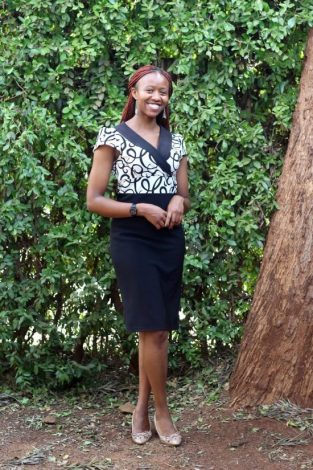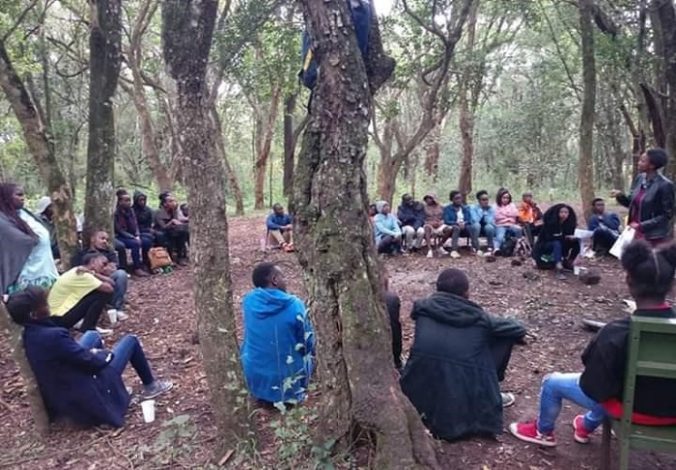A graduate of Moi University, Eldoret, and a cohort of 30 YALI participants at Kenyatta University. Together with other brilliant minds from other countries in East and Central Africa, they are positively contributing to society.
Meet Phyllis Wanja, an art pencil artist, together with her team, they are using art therapy as a key component when it comes to mental health.
She runs Afyakili, which focuses on art therapy to facilitate better mental health.
Daisy Moraa indulged her to know more about Afyakili, the inspirations, and the aspirations of their initiatives.

Afyakili is an organisation that offers Art Therapy, a form of expressive therapy that uses the creative process of making art to improve a person’s physical, mental, and emotional well-being.
We use Art to create awareness of Mental Health and offer Art therapy to people with the same.
Afyakili was brought to life on the 4th day of October 2017 and the name is a Swahili word created by combining two words ‘Health’ and ‘Mental’.
In fact, this was an idea conceived by one of my team members, Brent Kokonya, which we later adopted. My life as an Artist has contributed immensely to coming up with this concept, Art Therapy. It is being applied in some parts of the world like Europe and parts of West Africa to help people manage stress.
Motivation: There has been a rise in young people committing suicide in schools, especially University students in Kenya. This is normally due to depression and low self-esteem.
This was the motivation behind the idea of creating a safe space for expressing oneself freely without feeling judged.
A place where people facing mental health disorders such as depression, anxiety, and suicidal thoughts would find peace through Art, by the creation of Art, colouring, sculpturing, and photography. This eventually makes them more productive, happy, and purpose-oriented.
There is a lot of stigma surrounding mental health issues like suicide, depression, anxiety, and personality disorders. What was the initial response to you getting involved in mental health from your family, friends, and schoolmates?
Yes, I totally agree that stigma exists in this area. At first, it was really scary talking about Mental Health Disorders, but by God’s grace, the response has been encouraging.
My family supports the concept in many ways which I’m grateful for, not forgetting my team members, Alex Ngamau, Clive Lupao, Brent Kokonya, and Mwaniki Nyagah, who have been helping out in bringing Afyakili to where it is now.
My schoolmates have also supported the concept to date where some have taken up the role of advocating for Mental Hygiene among themselves.
Is this perspective-changing over time?
Yes, gradually, people are positively taking up the role to advocate for positive Mental Health to their peers.
Most Africans, and Kenyans, are conservative when it comes to mental health, how do you get to convince someone to accept help, and if they do, are their families supportive?
I do agree with this that most Africans and Kenyans are conservative, but individuals are reaching out. This does not only apply to Art Therapy but to all initiatives that advocate for a healthy mind or body, a great number of families have become supportive and are up to the task of helping their loved ones with mental disorders get well.
Where do you get the funds to run the project?
Apart from the support we received from Safaricom, the Blaze platform, we fund Afyakili by using our personal savings and support from family.
Any recognition from the work done, say by a body that would like to collaborate? Or rather what is your dream partnership with an organization?
Yes, this has been possible because of the interactions Afyakili has had with young leaders from East and Central Africa.
Most specifically, Cracking the English Centre from Congo Brazzaville, which has shown interest in allowing Afyakili to offer Art Therapy to their students, by teaching them the importance of having peace of mind.
What is your grand vision with the initiative? Are you looking to expand?
Afyakili’s vision is to help people manage depression and reduce the rate of suicide by 99.99%.
Yes, Afyakili would like to have centres in every county in our country, schools, hospitals, churches, corporates, correction facilities, and wellness centres, to be accessible and available to every person who needs our services, most especially nearer to the individuals with mental health disorders.
Are the services offered by Afyakili voluntary and free or is there a structure to be followed?
Currently, the services we offer for advocating for positive mental health are done voluntarily. However, we are currently designing a model that would fit our target market’s needs at an affordable rate.
Where are Art therapy sessions located?
Afyakili is yet to have a physical location to offer Art therapy sessions. We have, however, partnered with different centres that offer us access to our target market easily, such as churches, schools, and hospitals.
Closing remarks?
Mental Hygiene is a priority for every human being. Let us take good care of our minds at all times; let us keep our minds healthy.



